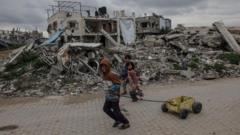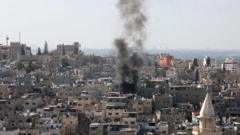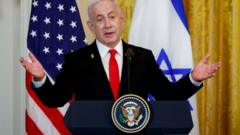As the ceasefire nears its expiration, Hamas has declared that further discussions with Israel hinge on the release of over 600 Palestinian prisoners. Israeli Prime Minister Benjamin Netanyahu's decision to delay the release has prompted concerns about a collapse of the current agreement, critically affecting negotiations for a lasting peace.
**Hamas Demands Release of Palestinian Prisoners Before Ceasefire Discussions**

**Hamas Demands Release of Palestinian Prisoners Before Ceasefire Discussions**
Hamas insists that negotiations for a ceasefire extension with Israel depend on the release of Palestinian prisoners as agreed, intensifying tensions in an already precarious situation.
The ongoing conflict between Israel and Hamas has witnessed a tense exchange of hostages and promises of prisoner releases, highlighting the complexities of diplomatic negotiations in the region.
In recent developments, Hamas has positioned its willingness to engage in ceasefire talks on the condition that Israel fulfills its commitment to release Palestinian detainees. Following accusations against Hamas for violation of terms during prior hostage handovers, Israel has postponed the release of more than 600 Palestinian prisoners, claiming these actions undermined the agreed-upon deal.
Hamas officials urged mediators, particularly from the US, to apply pressure on Israel to prevent any discourse on the ceasefire's next steps without clear commitments on prisoner releases. The ceasefire's first phase is set to conclude imminently, amidst warnings from UN Secretary-General António Guterres about the fragile nature of the current peace.
During the final week of the ceasefire, Hamas successfully handed over six living Israeli hostages. However, the manner of these transfers has drawn criticism; armed fighters displayed the hostages in public handover ceremonies, which many in Israel deemed exploitative and humiliating.
Israeli officials reported prior to the ceasefire's conclusion that they intended to release 620 Palestinian detainees in exchange for hostages. However, implementation faltered as Israeli authorities cited the need for secure measures before proceeding, amidst claims of Hamas's manipulative tactics during hostage exchanges.
In light of these developments, various stakeholders articulated their positions. The White House supported Israel's decision to suspend the prisoner release, contrasting their views on Hamas’s actions, further complicating the return to discussions around the ceasefire.
Amidst these negotiations, there remains a significant toll on both sides, with substantial casualties reported since the onset of hostilities following the attacks in October 2023. As conflicts continue to unfold with severe humanitarian consequences, how the international community navigates these negotiations will remain a critical focal point for finding a resolution.
The current context underlines the urgent need for decisive action to stabilize the situation in Gaza and foster opportunities for dialogue and peace between Israel and Hamas.
In recent developments, Hamas has positioned its willingness to engage in ceasefire talks on the condition that Israel fulfills its commitment to release Palestinian detainees. Following accusations against Hamas for violation of terms during prior hostage handovers, Israel has postponed the release of more than 600 Palestinian prisoners, claiming these actions undermined the agreed-upon deal.
Hamas officials urged mediators, particularly from the US, to apply pressure on Israel to prevent any discourse on the ceasefire's next steps without clear commitments on prisoner releases. The ceasefire's first phase is set to conclude imminently, amidst warnings from UN Secretary-General António Guterres about the fragile nature of the current peace.
During the final week of the ceasefire, Hamas successfully handed over six living Israeli hostages. However, the manner of these transfers has drawn criticism; armed fighters displayed the hostages in public handover ceremonies, which many in Israel deemed exploitative and humiliating.
Israeli officials reported prior to the ceasefire's conclusion that they intended to release 620 Palestinian detainees in exchange for hostages. However, implementation faltered as Israeli authorities cited the need for secure measures before proceeding, amidst claims of Hamas's manipulative tactics during hostage exchanges.
In light of these developments, various stakeholders articulated their positions. The White House supported Israel's decision to suspend the prisoner release, contrasting their views on Hamas’s actions, further complicating the return to discussions around the ceasefire.
Amidst these negotiations, there remains a significant toll on both sides, with substantial casualties reported since the onset of hostilities following the attacks in October 2023. As conflicts continue to unfold with severe humanitarian consequences, how the international community navigates these negotiations will remain a critical focal point for finding a resolution.
The current context underlines the urgent need for decisive action to stabilize the situation in Gaza and foster opportunities for dialogue and peace between Israel and Hamas.




















